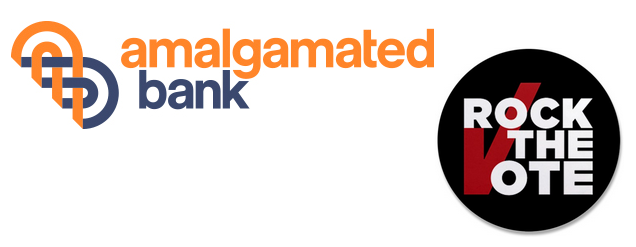By Joshua Freeman
Two organizations that come from different eras and different universes have joined forces to register voters and promote political involvement among New Yorkers. On Monday, the Amalgamated Bank and Rock the Vote announced a partnership to register voters for the November election. The bank will distribute voter registration forms in its twenty New York branches, sponsor an advertising campaign promoting registration, and join Rock the Vote in a national coalition to counter voter suppression.
Both organizations are in the process of reinventing themselves. Rock the Vote, founded nearly a quarter century ago, has launched a bevy of new campaigns to get young people to register to vote, pay attention to politics, and protect their rights. In addition to doing what it has always done – recruiting top-name entertainers to get the message out at concerts, on t-shirts, and in advertisements saying that young people should register – the organization has developed perhaps the best software out there for online registration (to the extent states allow it) and has helped build the “Protect Voting” coalition to counter voter suppression efforts, which are often targeted at students and young voters.
The Amalgamated Bank was founded back in 1923 by the Amalgamated Clothing Workers union. Before World War II, many unions sponsored banks, in part to make sure that working people with few assets could get loans and financial services, using any profits to advance the union cause. Most labor banks disappeared decades ago, but the Amalgamated has survived and grown, still union-owned. It recently announced a rebranding that may make that less obvious, changing its tagline from “America’s Labor Bank” to “Bank with Purpose” in an effort to broaden its customer base. Still, its alliance with Rock the Vote and its support for sick leave policies, increases to the minimum wage and corporate governance reforms, and its efforts to lessen CEO-to-worker pay disparity and increase strong bank regulation suggest it remains committed to the progressive vision of its long-ago founders.
Dr. Joshua Freeman is a Professor of History at the Murphy Institute, Queens College, and the CUNY Graduate Center.



